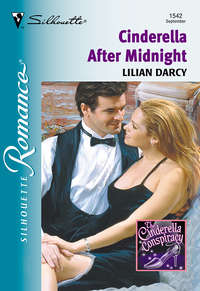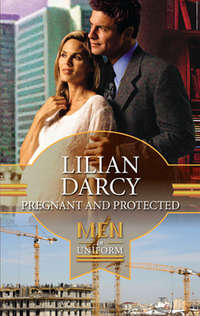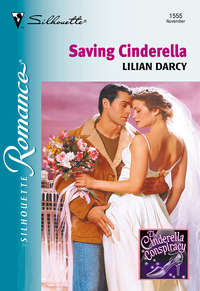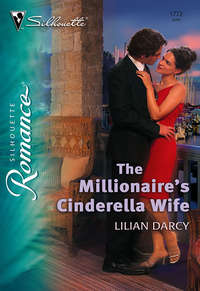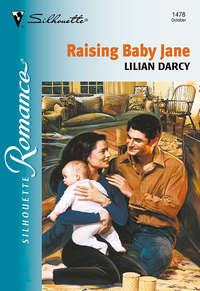
The Millionaire's Makeover
“It’s fine.” She kept the polite facade in place.
“But you probably didn’t expect to find yourself discussing my divorce,” he persisted.
“No. Your bio that I found on the Internet said you were happily married,” she blurted out, then mentally swore. Oh, shoot!
Ben Radford swore right out loud, and he didn’t say anything so mild as shoot. “We maintained the fiction for quite a while, but I’m afraid the Internet information is out of date. If I sound bitter about it, there are reasons.”
“So what went wrong?” she blurted again. Oh, this was getting worse and worse! Just because he’d let a couple of details that he clearly regretted already slip, that was no reason for her to keep this same conversational ball rolling. It was as if his forthright Irish housekeeper had slipped truth serum into their coffee. “Forget I said that,” she added quickly.
“I’ll answer, if you want.”
“No, no please.”
“Let me answer,” he insisted lightly. “I need the practice.”
She laughed before she could stop herself—oh Lord, what would he think now?—because it was the same thing she’d thought about him, some minutes ago, when they’d reached their first uneasy truce.
In dealing with men like Ben Radford, she definitely needed the practice.
“You have to laugh, don’t you?” he said. He wasn’t, though. He wasn’t even smiling. “Either that or punch walls. Which hurts, I’ve discovered.” He rubbed his knuckles to illustrate the point and made her laugh again.
Like Ben Radford himself, she wasn’t all that accustomed to laughter.
Her twin, Roxanna, laughed a lot.
Rox was bright and bubbly and confident, as well as creative, disorganized and quirky. She lived in Tuscany now, having fallen hard for a wealthy Italian businessman who loved her sizzling personality. She’d been the stronger, healthier twin at birth, while Rowena had been in and out of hospitals for years as a child, with respiratory problems and a heart defect that had required more than one operation to correct.
Formed by these childhood experiences, the differences between them had persisted into adulthood. Where Rox enjoyed parties and music and crowds of interesting people, Rowena liked the meditative silence of the research libraries where she tracked down her garden history and the fresh air and beauty of the gardens themselves. Where Rox turned men’s heads with her dazzling smile, Rowena became flustered and confused at male attention.
A serious clinical anxiety disorder had taken her out of the dating game completely for the past couple of years, and despite the huge progress she’d made under the guidance of her therapist, she knew she had some distance still to travel.
“I’ve never been divorced,” she blurted out. “Or married. Or engaged. Or even very serious.”
“You strike me as very serious.”
“About a man. Was what I meant.”
“I’m teasing you, Rowena.” She felt foolish, until he added unsmilingly, “Because if I don’t undercut your advantage a little, I am about to make myself very, very emotionally naked, telling a virtual stranger what went wrong with my marriage.”
“Oh, please don’t feel you have to do that!” She pressed a hand to her cheek, stricken at the fact that she seemed to have drawn out a vulnerable side to Ben Radford that she wouldn’t have thought could exist.
He wasn’t listening. “After I sold Radford Biotech, our divergent money styles became irreconcilable. I could phrase it that way.”
“Mmm,” she agreed politely.
“Do you think? How does it sound? I need more feedback than that.” He looked at her, and only now did she see that those dark eyes had softened, crinkling at the corners, inviting her to take this lightly.
She still didn’t fully understand the man’s motivation, but okay, sure. He was the client, after all…
“Too formal,” she said solemnly. She tapped the end of her pen against her bottom lip, while those eyes of his kept watching her.
“You’re right.” His mouth barely moved when he talked. Everything came out as a cynical, tight-lipped drawl. “How do I put it more simply?”
“You had different life goals?” she suggested. “Or, no, differing life goals.”
He gave a brief, crooked grin. “That’s not bad, Dr. Madison, not bad at all. You’re right. Ing. Differing. A subtle but significant improvement. It implies polite, ongoing disagreement. And says nothing whatsoever about what really happened.”
What did really happen? she wondered.
“Needs a little more, though,” he went on. “A kind of one-two-punch approach. Any thoughts on that?”
“But the two of you will always remain friends. That’s what you’d say if you were movie stars. And you’d still say it even if you couldn’t stand being in the same city as each other at the same time.”
“We would. We’d say exactly that. Heather will love it. Maybe I should write it down for her.”
He was still smiling at her, in his crooked, cynical, smoky-eyed and almost dangerous way, and all at once it was too much. It seemed more like flirting than anything else, and Dr. Rowena Madison just did not do flirting.
She didn’t know how.
And she didn’t want to learn.
He was standing too close. Rowie could sense his superior height and strength and bone-deep confidence like a gravitational pull. She could detect the finer nuances in the delicious way he smelled. The tantalizing scent of expensive male grooming products floated on the clear, dry Southern California air and seemed to belong there. It gave Rowena a dangerous, illusory sense that she belonged, too.
Belonged where, exactly?
The adrenaline rush generated by her earlier boldness was ebbing fast, leaving her with a million familiar doubts.
“You can stop teasing me now, Mr. Radford,” she said stiffly.
“I told you to make it Ben.”
“Yes, but I’m withdrawing to a more formal level to save us both from embarrassment later on.”
“You mean because of this uncomfortably personal conversation? Even though on the surface we’re treating it as a joke?”
“Yes.”
He heard a noise and glanced through the old gate to where he could just glimpse the driveway that curved in front of the house. A car sped around the curve and jerked to a halt.
“Unfortunately, it’s going to get even more personal any second,” he said. “And a lot less of a joke. This is Heather now.”
Chapter Two
Heather Radford caught sight of Rowena and Ben standing by the courtyard gate just as she stepped out of the low-slung yellow sports car, so she came along the side of the old adobe toward them, instead of going to the front door.
“My lawyer’s valuation of joint assets,” she announced by way of a greeting, and dumped an impressively thick binder of papers into Ben Radford’s hands.
Rowena felt almost comically inadequate when she considered the thin quantity of papers on her own clipboard. It was like a two-door compact car owner coming bumper to bumper with someone driving a brand-new Ferrari.
This woman had serious paperwork!
And if it wasn’t an actual Ferrari she was driving, it was something with the same flair.
“I’ll take a look at it later,” Ben said. “Heather, this is Dr. Rowena Madison, who’s doing some work on the garden.”
His voice had changed since their flirty conversation a minute or two ago. It was harder, tighter, with his English origins prominent in the clipped vowels. His face had changed, too. In the space of an hour, Rowena had seen him as the arrogant, impatient businessman, the intelligent connoisseur and the charmingly cynical flirt. Now she was shocked to see him as a human being through and through, with a beating, vulnerable heart.
He minded about the divorce, she realized.
Minded horribly, in a whole lot of ways that went bone deep and that he hadn’t even begun to come to terms with, yet.
For a moment there, she’d thought his light approach to the subject meant the opposite—that he didn’t care a bit. But now she could see she’d been wrong. He made those drawling jokes about it to mask the anger and failure and pain—mask them from others and from himself. He talked about it because he was still too raw to keep it to himself. He shrouded himself in a successful businessman’s arrogance because this was probably the first, and certainly the worst, failure he’d ever had to deal with in his life.
And at some level, he had no idea that this was what he was doing.
“Dr. Madison?” Heather echoed sharply. “You’re a doctor and you have to take a second job as a gardener to make ends meet?” She was a tiny, gorgeous blonde with bright-blue eyes, flawless porcelain skin and a pert nose, and she wore a cream silk trouser suit that would have taken out Rowena’s monthly dry-cleaning bill in a single hit. “Boy, did you pick the wrong specialty!”
It would have been a funny line, if the sarcasm level hadn’t been so high. Rowena had the impression that Heather could be a very funny woman when she wanted to be—funny and clever and captivating and even more ruthlessly cynical than Ben.
“I’m not a medical doctor,” Rowena said, her awkwardness rising back to where it had been just before she’d let fly at Ben Radford half an hour ago. “I have a Ph. D.”
“Ah, now it makes sense. There’s no money at all in academia. Wait a minute, though. You have a Ph. D. in actual gardening? You can do that?”
“I design and restore historic gardens, yes. My Ph. D. dissertation involved—”
Heather wasn’t interested in the subject of Rowie’s dissertation. She trained an accusing look on her not-quite-ex-husband. “How much work are you having done in the yard? You’re bringing in someone like this. I bet you’re landscaping the whole damn thing!”
“Not quite the whole damn thing, Heather. I’ve decided to leave the cattle runs alone,” Ben drawled. “The beasts seem happy enough with grass. I’m just doing the section behind the house.”
“Just? That’s an acre! More! And, let me guess, we’re not just talking about a few deliveries of dirt and flowers. This is going to be hugely expensive, isn’t it? You’re pouring yet more money into this impossible place, and it’s going to mess up the valuation and slow down the divorce. You’re doing it deliberately. I’m not fooled, Ben! Not for a second!”
“And I’m not doing it to be difficult,” he said tightly. “For heaven’s sake, Heather! You knew I wanted to restore the whole place when we bought it.”
“When you bought it, against my wishes. When you sold a brilliant, high-profit company for half or even a third of what you could have gotten if you’d waited another few years, just so you could mess around with money pits like your precious gallery and your precious casting agency and your restaurant and this wretched historic ranch that’s already soaked up a gazillion dollars. It makes zero sense! And don’t tell me again that you were bored.”
“I was, though,” he said curtly. “Horribly bored. I’d done everything I wanted to do with Radford Biotech. I’d made plenty of money and I didn’t want to hang on to it just so I could wear myself out making even more money doing more of the same thing. Heather, we’ve been through this a hundred times.”
“Yes,” she said bitterly. “And nothing changes. Which is why we’re getting divorced.”
“Is it?”
“Yes! So please, if you have any vestige of feeling left for the time we spent together, don’t mess up my lawyer’s incredibly careful and conscientious and fair valuation with this insane landscaping plan.”
She snatched the binder back from him, turned on a heel that was way too high for such a maneuver and stalked back to the car with her shoes cracking like gunshots on the paving.
Wa-a-ay better gunshots than Rowena’s own shoes had made when she’d attempted a similar exit, she noted with a twinge of self-mocking envy. It was the Ferrari versus the two-door compact, all over again.
Ben followed his not-quite-ex-wife, with that familiar, vinegary feeling flooding into his stomach.
They used to be happy, the two of them. Heather could bewitch a man, when she wanted to. Twelve years ago, as a very focused and overserious biotechnology student, he hadn’t had a clue why she’d chosen to bewitch him.
“I just fell for you,” she’d said later, but had added something that was possibly more honest. “I saw the potential.”
Fell for him, saw the potential, then made improvements.
He’d already spent most of his adolescence building up his body as an antidote to the crippling loneliness and brutality of his expensive British boarding school, but he’d never taken any interest in clothes. Heather supervised his grooming and his wardrobe, boosted him out of his solitude and seriousness in a hundred energetic and very determined ways. And since he didn’t like failure, he had recognized that everything she wanted for him was necessary and important.
On the business front, she supported him in applying for commercial patents on his ideas instead of his original plan of going into academic research, and helped him start his company while he was still completing his master’s degree.
He’d respected her for all of it and had kept the respect for years. He’d loved her, and considered their marriage to be as close to ideal as marriage could get. Practical. Workable. Companionable. A success. In fact, he still didn’t want to deny the years they’d been happy together. Why backdate their failure that far?
Heather was no airhead herself. She’d come to England on a college scholarship, and she had ambition as well as brains. When she’d shelved her own plan to become a research chemist in order to put her energy into helping him build Radford Biotech, he’d seen it as a sacrifice on her part.
Now he wasn’t so sure. Had she viewed him as nothing more than a diamond-encrusted meal ticket all along? The prospect galled him, and made him question his own judgment.
He’d first put forward the idea of selling the company around two and a half years ago, at a time when he’d also begun to think seriously about starting a family. Heather had been against the sale from the beginning. “As far as I’m concerned, the company’s still in its infancy. Its potential is barely tapped.”
“Look at me, though, Heather,” he’d argued from the heart, in a way he rarely did. “I’m in a business suit sixteen hours a day. My frequent-flyer miles could get me to the moon and back on a free first-class ticket. I never even get into the labs to play around with ideas anymore, let alone have a chance to do anything else that interests me. You used to tell me I was too serious when we first met, now you want to push me right back into that box. I’m not interested in that box anymore. There are other challenges out there, other frontiers. What’s it all for?”
“Oh, around five hundred million in pocket change, maybe?”
“Don’t we already have more money than we can spend? I never get time to spend any of it. And I’ve never cared about cold cash for its own sake, you know that.”
He’d talked about wanting to enjoy his business interests, wanting to apply his mind and his energy to something new, wanting to give a percentage of their growing fortune to carefully chosen charities, wanting to have kids who would actually know what he looked like because he would have time to spend with them occasionally, wanting to buy a house and some land that was unique and really worth something, not just a mega mansion amongst a dozen others in the billionaire version of a gated community, but Heather had hated all of those ideas.
She’d almost been frightened of them.
And she’d been adamant that she didn’t want kids.
She’d come from a difficult background. An unhappy family, poverty and debt and struggle. She’d made herself into the woman she was through sheer gritty determination, brains and hard work. She wanted to keep climbing the ladder of success higher and higher, and she seemed terrified by the idea that Ben might invest in business interests that didn’t pay off—that they might have a few million dollars less in the bank, five years from now, rather than a hundred million more.
She had an unrealistic, gut-level fear that they would lose everything and end up in the gutter. He began to understand that no fortune would ever be large enough for her, no financial security blanket ever thick enough.
He tried to get her to see why she was like this, that it was sourced in unresolved feelings about her childhood, and that it was a problem. He suggested therapy, but she wouldn’t listen. “I’m a strong person, Ben. I know what I want and what I don’t want, and I don’t intend to change. Is that wrong?”
He’d kept trying, for almost two years, but their dealings with each other only became angrier and more distant, with no compromise possible on either side. When he’d sold Radford Biotech, Heather had yelled at him for three days, then didn’t speak to him at all for a month. When he’d bought the Santa Margarita ranch and tried to share with her his vision of how beautiful it could be, she’d started threatening divorce.
Even then he didn’t give up on his marriage. His own father had bullied his mother for years. They’d been a terrible match, after the first sizzle of desire wore thin. They’d divorced when Ben was fourteen. That was why he’d been packed off to boarding school, to keep him away from the ugliness. The fact that he’d been utterly miserable at boarding school wasn’t an issue for his parents. They’d never asked if he was happy, and he’d never told them. But he’d vowed then with an icy kind of idealism that he wasn’t going to repeat any of their mistakes.
He wasn’t a quitter, he wasn’t used to failure, and he wanted to turn this around.
But marriage required commitment from both parties, not one, and Heather wasn’t interested in trying, just in getting her fair share. That valuation of assets she’d presented to him and then snatched back again just now was the product of months of bitter wrangling between them.
Heather wanted as much liquid finance as she could possibly argue for. When it was safely in her hands, she planned to invest it in a mix of reliable stocks and gilt-edged securities to make it grow and grow for the rest of her life so that, like Scarlett O’Hara in Gone With The Wind, she would never risk being hungry again.
Ben suspected she wouldn’t even attempt to marry for love, next time around. It would purely be a business transaction—the best dollar value she could get for her assets of beauty and brains and social ambition. He was bitterly angry with her, bitterly disappointed in his own utter failure to get her to change, and deeply sorry for her at the same time. None of these emotions left much room for love, and all of them had shaken him to the core. Hell, he never intended to go through something like this ever again!
“Explain something, Heather. Why does my plan to landscape Santa Margarita affect the valuation?” he asked as she climbed into her car.
“Because you’re going to pour a huge amount of money into it, and that kind of thing never recoups itself in the value of the house. You’ll put in a quarter of a million dollars, and the valuer’s estimate on the house will go up by twenty thousand.”
“Even if that’s true, does it really matter?”
“Oh, you mean, what’s a stray couple of hundred thousand dollars between friends?”
“Yes. That’s exactly what I mean.”
“I want what’s mine, Ben.”
“Aren’t you getting enough already?” Many millions, as he well knew.
“Are you suggesting I didn’t contribute as much as you did to the success of Radford Biotech?”
“Heather—”
“Forget it.” She put up a hand, then turned the key in the ignition, and said above the flare of engine noise, “Our lawyers can talk about this. We’re sure as heck not going to get anywhere with it on our own.”
“No, we’re not,” he agreed. It was one of the few things left in their lives that they did agree on.
“Someday, Ben, your charmed life will come to an end.”
“That’s not a threat, I hope.” Threat or not, it chilled him to think that she wished him ill.
“Of course it’s not. I just hope that when it happens you have the right insurance, that’s all.”
“I think our definitions of the word insurance are probably very different.”
“Very! Don’t give me your spiel on the subject. People and memories and priorities and values. I’ve heard it before. And by the way, I think you’re making a huge mistake with whatshername.” She thumbed over her shoulder in the general direction of Rowena Madison and the derelict garden.
“You mean the project or this particular consultant?”
“Both.” Heather snapped her car into gear, revved the engine again, then spun around with a spray of gravel and dirt that showered desert dust onto his trouser legs and shoes.
“Thank heaven we never had children,” he muttered as he watched her drive away. It was the only piece of positive thinking he could drag from the whole mess.
Then he turned to find Rowena Madison standing quietly nearby, awaiting his attention. She must have come out here through the side gate when she’d heard Heather’s car starting. Her serious, enormous eyes were fixed on him with a troubled expression in their dark-blue depths. Her willowy figure had an angular look. Tightly bent elbows, hunched-up shoulders. The set of her limbs created a force field of distance.
She had a very nice body, he decided, although she didn’t seem to be aware of the fact and certainly had no idea how to dress herself to her own advantage. He assessed her impatiently for a moment.
The severe colors and tailored silhouette were totally wrong, especially with her hair—apart from one wandering strand—folded up so tightly on the top of her head. Her eyes would be incredibly beautiful if she did anything whatsoever to help people notice them. Someone should damn well tell her that she didn’t have to imitate a nineteenth-century schoolteacher in order to look like a competent professional.
The escaped strand of bouncy dark hair blew across her face and snagged against her full mouth. She let it stray between her nicely shaped lips and began to chew on it, and he had a ridiculous impulse to pull the strand away and scold her.
Chewing on your hair, Dr. Madison? An appalling habit. Don’t ever let me see you do it again! And do something about the way you dress!
Suddenly she reminded Ben of how he’d been himself, fifteen years ago, at around eighteen or nineteen—so much going for him in some areas and so clueless in others. If he could change, then so could she.
Heather couldn’t. She didn’t even want to try…
But he wasn’t thinking about his ex-wife right now.
He wanted to grab Rowena Madison and stand her in front of a mirror and tell her, “Look at yourself! Attractive, intelligent, perceptive. Don’t be so afraid to let it show. Don’t be afraid to take risks and to feel. Make an effort. Change. Fight. And please, don’t be afraid to let other people get close to you.”
Although not me, he mentally revised, because I’m not ready to get close to anyone.
Just when he really was about to scold her about the hair chewing, she caught herself at it, frowned in disgust, hooked the strand out of her mouth and tucked it back behind her ear.
“Much better,” he murmured.
“Oh…” She was clearly upset that he’d seen.
“I was about to tell you to stop.”
“Um, thanks. I try not to do it. I’ve almost stopped. But sometimes it happens when I’m thinking about something else.”
Right now, Ben realized, the something else would be his divorce, and that line he’d let slip about not having kids. She’d almost certainly heard him.
Damn.
“But at least I don’t bite my nails anymore.” She held them up for his approval and threw him a wobbly yet triumphant smile.
He gave her what she wanted. “Good. That’s great.” It was like congratulating a five-year-old who’d eaten her green vegetables three nights in a row, but he meant it, too. “Bad habits are pretty hard to let go of sometimes,” he told her.


